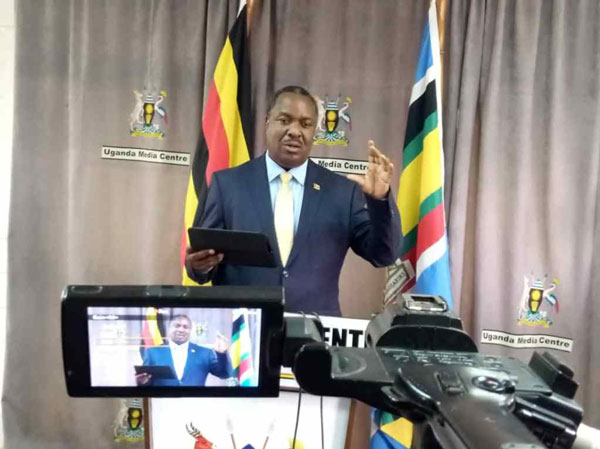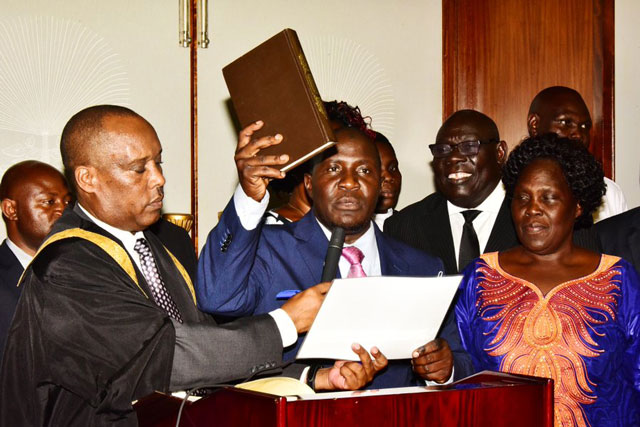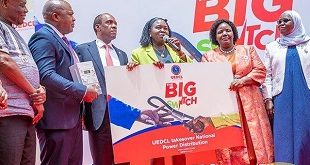
Kampala, Uganda | THE INDEPENDENT | A unanimous judgment by five Constitutional Court justices led by the Deputy Chief Justice, Alphonse Owiny-Dollo has overturned the election of six members of parliament in newly created municipalities across the country.
The affected are Patrick Ocan, the Apac Municipality Member of Parliament, Elioda Tumwesigye, Sheema Municipality, Tarsis Rwaburindore Bishanga, Ibanda Municipality, Hashim Sulaiman, Nebbi Municipality, Asuman Basalirwa, Bugiri Municipality and Peter Abrahams Lokii, Kotido Municipality.
The unanimous judgment stems from an application filed by the former Bufumbira East MP, Eddie Kwizera challenging the legality of a number of constituencies created after the 2016 general elections. Kwizera argued that the six constituencies were illegally created by parliament and asked court to declare them null and void.
He also asked court to have them expunged from government records, nullify the election of the areas MPs and direct them to refund taxpayers’ money.
In his application, Kwezira argued that the resolutions of parliament creating the contested constituencies violated Articles 61(c) 63(2) and 91(1) of the Constitution. Articles 61 and 63 prescribe how Constituencies are to be created while Article 91(1) mandates parliament to make laws through bills passed and assented to by the President.
Kwizera said that parliament could only create constituencies through an Act of Parliament and a mere resolution. Now, in their judgment delivered on Friday, December 27, 2019, the constitutional court justices, noted that the elections conducted in the new municipalities were premature, null and void because there were no vacant positions.
“In the premises, I would hold that the elections conducted in the sixth affected municipalities mentioned in this judgment are not elections for an office of Member of Parliament existing under the Constitution because they are not general elections or by elections. Secondly, the seats contested for did not have a vacancy and were already represented by the elected MPs in the general elections of 2016,” said Justice Christopher Madrama.
He noted that the parliamentary elections conducted in Apac, Sheema, Ibanda, Nebbi, Bugiri and Kotido municipalities for non – existent vacancies or seats cannot stand. Madrama said that Article 61 (1) (b) of the Constitution places a duty on the Electoral Commission to conduct elections in accordance with the Constitution and that it was its duty to ensure that each county is represented in Parliament as stipulated by the Constitution only where there is a vacancy.

“Vacancies would occur in the municipalities of Apac, Sheema, Ibanda, Nebbi, Bugiri and Kotido with the necessary demarcation by the second respondent and would be available for contest in the next general elections upon dissolution of the sitting,” he added. The Judges ordered that no seats should be created by creating more constituencies after the general elections have been held, except in accordance with the Constitution.
Kwezira’s lawyer Wandera Ogalo submitted that on 9th August, 2016 Parliament of Uganda passed a resolution prescribing the number of constituencies in the country to be 296. Six out of the 296 were to come into effect after 9th August, 2016.
He argued that the rest were simply recognised as having come into existence in or about 2006, 2011 and 2016.
In respect of the six, the second respondent (Electoral Commission) went ahead and organised, supervised and conducted elections in July, 2010. The Electoral Commission had earlier on held elections in the others without Parliament having prescribed the numbers of constituencies Uganda should have first.
Justice Madrama agreed, and said that the Constitution envisages that any vacancies created by division or creation of more constituencies or alteration of boundaries of constituencies shall take effect in the next general elections.
He ordered that Electoral Commission within one year files in court evidence of the prescription of Parliament dividing Uganda into the number of constituencies pursuant to the mandate exercised by Parliament under Article 294 and 63 (1) of the Constitution for the next general elections.
The court further directed the Commission to file evidence in court indicating that it has demarcated the boundaries of constituencies in accordance with the prescription of Parliament under Article 63 at least 10 months before the next general elections. The Judges noted the fact that the affected MPs were not heard in the petition but observed that their right to a hearing wasn’t violated in anyway because what was asked of court was whether the office of MP in the contested municipalities exists in terms of a vacancy under the Constitution before the next general elections.
Hashim Sulaiman, the Nebbi Municipality MP, said he had just received the news about the nullification of their elections, but noted that the judgement is against government and particularly EC, which is in charge of the election and declined to comment further. Asuman Basalirwa, the Bugiri Municipality Member of parliament, said they were condemned unheard.
He also said since government created a constituency it couldn’t remain vacant without representation. However, said they remain in parliament, since the Commission and government have indicated their decision to appeal the judgement.
“In case they don’t i will do it on myself because of the time and resources we spent in the elections,” he said. The other justices of the constitutional court include Kenneth Kakuru, Cheborion Barishaki, Fredrick Engonda-Ntende and Christopher Madrama.
Tumwesigye reacts
Dr. Elioda Tumwesigye, says that he isn’t bothered by the Constitutional Court judgment nullifying his election since his focus is on the 2021 general elections.
He told URN that the judgment was directed at the Electoral Commission (EC) and Attorney General and not the legislators as individuals.
“So, the lawyers can argue out if they want to appeal. But those are challenges that are on this planet. People face challenges, if you don’t want challenges or don’t face any difficulties you go to fool’s paradise but if you are on this planet, you get challenges but fire on. Me I don’t have time for negative energy, I have time for positive energy so, the responsible people will sort it out,” he argued.
The Minister said that he is currently in his constituency focusing on the next election.
Constitutional Petition No 20 of 2018 by The Independent Magazine on Scribd
****
URN
 The Independent Uganda: You get the Truth we Pay the Price
The Independent Uganda: You get the Truth we Pay the Price



